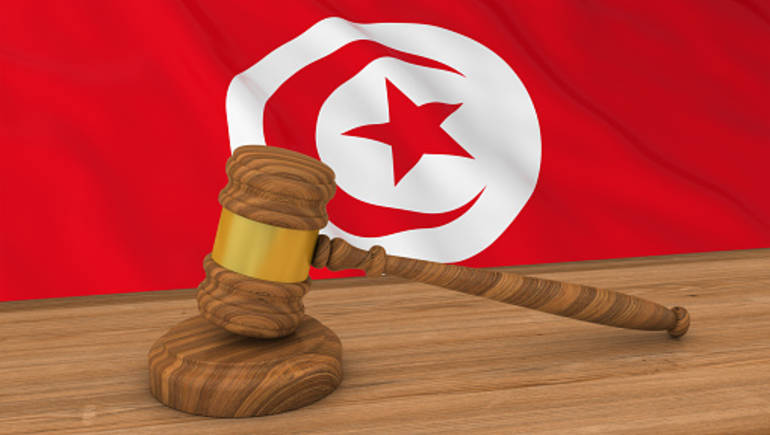Disciplining Tunisian Judges: A Confused Roadmap

Tunisia’s new law establishing a Temporary Body for the Judiciary does not address substantive rules governing the disciplining of judges.[1] The law is silent on the matter, from the mechanisms for disciplinary sanctions to defining what forms of misconduct merit discipline, to the notion of proportionality between misconduct and punishment. Instead, the law leaves the door open for applying the provisions of Law 29 (1967) concerning judicial discipline.[2]
Confusing the matter further, however, is the fact that the 1967 law does not itself include a precise definition of judicial misconduct. Rather, Article 50 of that law merely states that any “act that is deemed to violate judicial duties, honor, or dignity, if committed by a judge constitutes misconduct requiring disciplinary action”. This leaves broad discretionary authority to the Discipline Committee to determine what qualifies as punishable misconduct. The result is the absence of a legislative framework and the simultaneous validity of two pieces of legislation with differing approaches. The Temporary Body for the Judiciary has therefore been tasked with the responsibility of creating jurisprudence regarding judicial discipline. The responsibility will be carried out under the watchful eye not only of judges and the judiciary, but public opinion as well; this lends the statements and positions of the Temporary Body for the Judiciary a unique significance.
Given the challenges of reconciliation in the post-revolutionary period, this is a fundamentally important task. On one hand is the need to restore public confidence in the judiciary and its judges; this requires the establishment of strict and effective accountability mechanisms in order to break with the judiciary’s dismal image before the revolution. On the other hand is the need to restore the confidence of the judges themselves, and to send them a message of reassurance; particularly following the arbitrary measures taken against some judges when dismissals were issued in 2012.
Perhaps the most significant characteristic of this process is the emergence of new concepts of what constitutes judicial misconduct itself. The particulars of these new ideas emerged through the revolutionary context; they were clarified in part, for example, through the findings of the National Dialogue on Transitional Justice. As a consequence, updated notions of what counts as judicial misconduct have appeared as the Temporary Body for the Judiciary has cited new reasons for taking disciplinary action. These include issues connected to a judge’s popular reputation, lack of political neutrality, and unexplainable gains in wealth.
A Tarnished Popular Reputation
Some disciplinary decisions have indicated a new concept of judicial misconduct based on a judge’s general conduct. Based on the responses to appeals of disciplinary decisions, it seemed clear that the Body has established a principle of taking disciplinary action based on a judge’s “popular reputation”, and the consistency of repeated infractions of a judge’s constitutionally mandated responsibility to maintain neutrality and integrity.[3] Public confidence in the judicial system and in judges’ moral authority and integrity is of the utmost importance. [As per the Bangalore principles], “justice must not merely be done, but must also be seen to be done”.
In its response, the Body explained its principle that, “the judge, unlike other employees of the state, is subject to rigorous popular scrutiny, and anything he does might present an opportunity for a reasonable observer to doubt his integrity; that he can be considered to be in breach of his professional duties should he be seen as not taking the necessary precautions to avoid suspicion, or placing himself in a position inviting blame or rebuke in such a way that would form a public opinion in continual doubt of his integrity.”[4]
Regardless of how strong the theoretical argument might be for using a judge’s “tarnished popular reputation” as the basis for disciplinary measures, it can only be relied upon to the extent that it holds up to appeal in the Administrative Court. All this also carries the dangers of prejudice, given the absence of guarantees of robust procedures and means of proof.
Perhaps in anticipation of such risks, the Body has sought to adopt a set of indicators (un faisceau d’indices) for evaluating the reputation of judges who are the subject of disciplinary scrutiny. For example, in one case, it noted that “statements and rumors that surround the judge’s career have come to light, materializing both through the frequency of complaints against him, and what he himself has acknowledged: repeated rumors that have maligned his honor and designated him as someone surrounded by comments and rumors fed by conflicting circles of interests, both within the judiciary and outside of it”. Such indicators help build a case for a “tarnished reputation”, which can be materially confirmed by way of compromising political affiliations and unexplained increases in wealth.
Lack of Political Neutrality
Dispelling the image of the judge as subordinate to the ruling power is among the most important revolutionary claims for which the Temporary Body for the Judiciary is responsible. The Body has stated that “confusion on the part of some judges regarding the fact that partisan activities are a clear violation of the duty of neutrality that is required of judges in accordance with Article 103 of the Constitution, and a violation of the most basic judicial ethics.[5] It counts among serious forms of misconduct that demand disciplinary accountability.”[6]
This attitude is enshrined through numerous disciplinary decisions that led to the dismissal of judges affiliated with the Constitutional Rally party, which was in power before the revolution. In holding the judges accountable for these affiliations, the Body stated that explicit or prominent party affiliations in connection with partisan activities were “a deviation from the ethics and duties of the profession”. When its decision was challenged before the Administrative Court, its response affirmed its rejection of party affiliations, which “render the judge in question incapable of presenting himself as a judge loyal only to the mission of the judiciary…”
It went on to state “that the affiliation of some judges with the ruling party, and with the activities at the heart of the party organization, based on serving narrow partisan and factional interests, has historically represented a primary means for undermining the independence of the judiciary and of judges, making it a pillar of the authoritarian regime. It empowered that regime to inflict injustices against individuals and groups in the guise of justice and rule of law”. As a result, “if a judge seeks to become close to those in power and to serve their interests in any form or fashion, this is considered a serious form of misconduct meriting his dismissal”.
Unexplained Increases in Personal Wealth
Tunisian law has no general legislative framework criminalizing unexplained increases in wealth. Yet this has not precluded the Temporary Body for the Judiciary from adopting this concept; not as an independent reason to take disciplinary action, but as supporting evidence in cases where judges involved in disciplinary proceedings are the subject of complaints, or other evidence of a lack of impartiality exists.
In this context, one of the Body’s disciplinary decisions cited repeated and consistent complaints about a judge’s acceptance of bribes. Although criminal investigations cleared the judge of the charge of bribery, the Body nevertheless concluded that an unexplained increase in his wealth was sufficient cause to dismiss him. In justifying its position, it stated that “given his place of residence and what was known of his lifestyle (train de vie), as a judge at the start of his career there was nothing to justify his possession of significant real estate. In the end, this renders him unqualified [to be a judge]. For the weak do not fear injustice from an impartial judge, and the powerful do not seek to entice him. His judicial appointment makes clear, once again, how the judiciary as a whole has acquired a reputation that prompts skepticism and damages the sense of trust that should be placed in it”.
This article is an edited translation from Arabic
__________
[1] Basic Law No. 13 of 2013, dated May 3, 2013, which established the Temporary Body for the Judiciary.
[2] According to Article 20 of Basic Law 13 of 2013, “all statutes in conflict with this Basic Law are abrogated, and the statutes of Law 29 of 1967, dated July 14, 1967, on the judicial system, the High Judicial Council, and the Basic Law on Judges, which do not conflict with this Basic Law, remain in effect”.
[3] Article 103 of the Tunisian Constitution states: “Judges must be competent, and should be characterized by neutrality and integrity. They shall be held accountable for any shortcomings in their performance.”
[4] According to the third value of the Bangalore Principles of Judicial Conduct, “A judge shall ensure that his or her conduct is above reproach in the view of a reasonable observer”, and “the behavior and conduct of a judge must reaffirm the people’s faith in the integrity of the judiciary”.
[5] Article 14 of the International Covenant on Civil and Political Rights specifies that everyone has the right to “a fair and public hearing by a competent, independent and impartial tribunal”. The second principle of the Basic Principles on the Independence of the Judiciary similarly affirms that the role accorded to the judiciary is to “decide matters before them impartially, on the basis of facts and in accordance with the law, without any restrictions, improper influences, inducements, pressures, threats or interferences, direct or indirect, from any quarter or for any reason”.
[6] The Temporary Body for the Judiciary, meeting in its session on June 15, 2016, concerning the political neutrality of judges.



